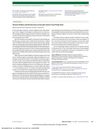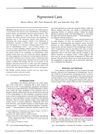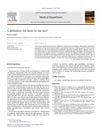June 2021 in “International journal of cosmetics and dermatology” Vitamin C and E may help with certain skin and hair conditions, but more research is needed to confirm their effectiveness.

Certain drugs can worsen hair loss in people prone to androgenetic alopecia.
5 citations,
January 2014 in “Advances in bioscience and biotechnology” Natural honey protects against Doxorubicin's harmful effects.
 2 citations,
June 2022 in “Molecules”
2 citations,
June 2022 in “Molecules” Connarus semidecandrus Jack extract promotes hair growth and thickness, reduces prostate cancer cell growth, and could potentially be used as a treatment for hair loss.
2 citations,
March 2020 in “JAAD case reports” A leukemia patient showed skin peeling similar to kwashiorkor, a severe protein deficiency.
130 citations,
December 1998 in “The journal of investigative dermatology/Journal of investigative dermatology” Hair follicle melanocytes die during hair regression.
 12 citations,
February 2022 in “Acta Biomaterialia”
12 citations,
February 2022 in “Acta Biomaterialia” Minoxidil-loaded hyaluronic acid microneedles can effectively increase hair growth and could be a promising treatment for hair loss.
 7 citations,
March 2022 in “Molecules”
7 citations,
March 2022 in “Molecules” 5-Bromo-3,4-dihydroxybenzaldehyde could potentially help hair growth by activating certain cell pathways and inhibiting others.
 November 2024 in “International Journal of Applied Pharmaceutics”
November 2024 in “International Journal of Applied Pharmaceutics” Fenugreek seed extract in nanoparticles effectively promotes hair growth.
154 citations,
October 1996 in “Proceedings of the National Academy of Sciences of the United States of America” Estrogen affects hair growth and skin cell multiplication.
29 citations,
November 2011 in “Cell stress & chaperones” Quercetin effectively treated and prevented hair loss in mice.
18 citations,
June 2010 in “Cell Stress and Chaperones” Heat treatment increases hair loss in certain mice.
11 citations,
December 2021 in “Journal of Ginseng Research/Journal of ginseng research” Red ginseng oil is believed to have various health benefits and is safe, but more research is needed to fully understand how it works.
 1 citations,
April 2023 in “Biomolecules”
1 citations,
April 2023 in “Biomolecules” Fermented papaya and mangosteen in hair care products helped prevent hair loss and improve hair thickness.
 1 citations,
October 2021 in “Clinical, Cosmetic and Investigational Dermatology”
1 citations,
October 2021 in “Clinical, Cosmetic and Investigational Dermatology” Vitamin B3 may help prevent hair loss and promote hair growth by protecting scalp cells from stress and reducing hair growth-blocking proteins.
 September 2023 in “Biomedical Optics Express”
September 2023 in “Biomedical Optics Express” New imaging techniques show testosterone delays hair growth and shrinks follicles in mice, but have limited depth for viewing.
May 2023 in “International journal of molecular sciences” The ABCA4 gene protects hair follicle stem cells from toxic vitamin A byproducts.
 January 2023 in “Springer eBooks”
January 2023 in “Springer eBooks” Hair shedding that lasts over 6 months may need a closer look, but often just reassurance is enough.
 1 citations,
June 2018 in “JAMA Dermatology”
1 citations,
June 2018 in “JAMA Dermatology” Vitamin C was found to effectively treat prickly heat in children.
 13 citations,
August 2012 in “Journal of the American Academy of Dermatology”
13 citations,
August 2012 in “Journal of the American Academy of Dermatology” A rare scalp condition causing hair loss and cysts in young men can be treated effectively with a specific steroid injection.
 95 citations,
December 1980 in “The New England Journal of Medicine”
95 citations,
December 1980 in “The New England Journal of Medicine” Minoxidil helped bald patient regrow hair.
 60 citations,
December 2015 in “Lasers in Medical Science”
60 citations,
December 2015 in “Lasers in Medical Science” Low-level laser therapy is safe and can increase hair growth for male and female pattern hair loss.
 16 citations,
July 2013 in “The American Journal of Dermatopathology”
16 citations,
July 2013 in “The American Journal of Dermatopathology” Pigmented casts are common in several hair loss conditions and can help diagnose specific types of alopecia.
 2 citations,
May 2012 in “Annals of Oncology”
2 citations,
May 2012 in “Annals of Oncology” Patients with advanced breast cancer and high hormone receptor levels who had surgery for ovarian/pelvic metastases lived longer, especially if they had high estrogen receptor levels.
 124 citations,
August 1994 in “Journal of Investigative Dermatology”
124 citations,
August 1994 in “Journal of Investigative Dermatology” Dexamethasone speeds up hair loss in mice, while cyclosporin A slows it down.
 24 citations,
September 2001 in “Journal of Dermatological Science”
24 citations,
September 2001 in “Journal of Dermatological Science” Cyclosporin A helps damaged hair follicles regrow hair quickly.
 4 citations,
December 2012 in “Medical Hypotheses”
4 citations,
December 2012 in “Medical Hypotheses” Prediabetes may be a risk factor for hair loss.
 February 2024 in “Curēus”
February 2024 in “Curēus” Topical 5-Fluorouracil can rarely cause nerve damage, especially in people with a certain genetic deficiency.
 January 2016 in “Human & Experimental Toxicology”
January 2016 in “Human & Experimental Toxicology” A specific DNA sequence caused hair loss in male mice by activating immune cells and increasing a certain immune signal.
 236 citations,
July 2001 in “Trends in Molecular Medicine”
236 citations,
July 2001 in “Trends in Molecular Medicine” Future hair loss treatments should aim to extend hair growth, reactivate resting follicles, reverse shrinkage, and possibly create new follicles, with gene therapy showing promise.




















